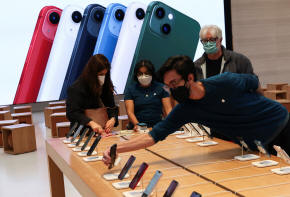Apple, others face shipment delays as China COVID curbs squeeze
suppliers - analysts
 Send a link to a friend
Send a link to a friend
 [April 15, 2022] By
Josh Horwitz and Sarah Wu [April 15, 2022] By
Josh Horwitz and Sarah Wu
SHANGHAI/TAIPEI (Reuters) - Shipments of
some Apple products, as well as Dell and Lenovo laptops are likely to
face delays if China's COVID-19 lockdowns persist, analysts said, as
curbs force assemblers to shut down and closed-loop arrangements get
harder to maintain.
China's race to stop the spread of COVID-19 has jammed highways and
ports, stranded workers and left countless factories awaiting government
approval to reopen - disruptions that are rippling through global supply
chains.
Apple Inc supplier Pegatron Corp said this week it would suspend its
plants in Shanghai and Kunshan, where according to supply chain experts
it produces the iPhone 13, the iPhone SE series, and other legacy
models.
Quanta Computer Inc, which produces some three-quarters of Apple's
Macbooks globally, also shut operations, which could impact delivers
more severely, analysts said.
The final impact on Apple's supply chain is uncertain and depends on
factors including how long lockdowns persist.

The company may also consider re-routing production out of Shanghai and
Kunshan to factories elsewhere, such as Shenzhen, which currently is not
under lockdown, analysts said.
"Apple may consider transferring the orders from Pegatron to Foxconn,
but we expect the volume may be limited due to the logistics issue and
the difficulty of equipment adjustment," said Taipei-based Eddie Han, a
senior analyst at Isaiah Research. Foxconn is the trade name of Hon Hai
Precision Industry Co Ltd .
As a worst-case scenario, Pegatron may fall behind on 6 million to 10
million iPhone units if the lockdowns last two months and Apple cannot
reroute orders, Han said.
Apple did not respond to a request for comment.
The chief executives of Huawei Technologies Co Ltd and Xpeng Inc have
flagged huge economic costs if factories in Shanghai cannot resume
production soon.
[to top of second column] |

An employee arranges Apple iPhones as customer shop at the Apple
Store on 5th Avenue shortly after new products went on sale in
Manhattan, in New York City, New York, U.S., March 18, 2022.
REUTERS/Mike Segar

Shanghai is approaching its third week of lockdown and has shown no sign of a
wide re-opening.
Forrest Chen, research manager at Trendforce told Reuters that if lockdowns lift
in a few weeks, there is still a chance to recover.
However, "if the lockdown lasts longer than two months, there is already no way
to recover. At that point, after lockdown lifts, there would be a shortage for
end-users," he said.
Some suppliers may be able to re-route production.
Unimicron Technology Corp, which makes printed circuit boards for companies
including Apple, told Reuters the impact of the Kunshan lockdown so far has been
minor and that it can rely on other plants in the Hubei province and Taiwan to
support production.
But logistics and transport remain a nationwide issue, as cities across China
enact measures.
One factory owner in Kunshan told Reuters that the district government had
announced protocol for re-opening but provided no date for implementation.
Laptop makers may also suffer, including Compal Electronics Inc, a Taiwan-based
company that makes PCs for Dell Technologies Inc and Lenovo Group Ltd from its
plants in Kunshan. Chen estimates that roughly 50% of Compal's laptop production
is located in Kunshan.
Compal told Reuters on Friday that it had not halted production in Kunshan. Dell
and Lenovo did not respond to emails seeking comment.
(Reporting by Josh Horwitz in Shanghai and Sarah Wu in Taipei; Editing by
Sayantani Ghosh and Christopher Cushing)
[© 2022 Thomson Reuters. All rights
reserved.]This material may not be published,
broadcast, rewritten or redistributed.
Thompson Reuters is solely responsible for this content.
 |